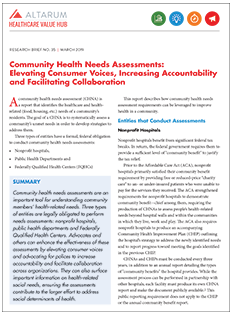Improving Value
Community Benefit and Community Health Needs Assessment
A community health needs assessment (CHNA) is a report that identifies the health care and health-related (food, housing, etc.) needs of a community’s residents. The goal of a CHNA is to systematically assess a community’s unmet needs in order to develop strategies to address them. CHNAs can be a powerful tool to create healthier communities if reporting entities are supplied strong guidance, sufficient resources and solicit input from a diversity of stakeholders.
Three types of entities have a formal, federal obligation to conduct community health needs assessments:
- Nonprofit hospitals,
- Public Health Departments and
- Federally Qualified Health Centers (FQHCs).
In many communities, these organizations work in silos, each producing an assessment unique to their organization or agency. Lack of coordination wastes resources and yields repetitive, yet incomplete, assessments. City- or county-wide assessments produced by a coalition of community stakeholders represent the “gold-standard” when it comes to comprehensively assessing a community’s needs. States can lay the foundation for this work by expanding community health need reporting requirements to include other organizations that influence health. For example, New Hampshire requires nonprofit behavioral health providers, retirement communities and nursing homes to produce CHNAs and community benefit plans, as well.
Other opportunities to improve CHNAs include:
- Strengthening guidance to more meaningfully include community residents and assess social needs, and
- Increasing transparency and accountability with respect to the prioritization of needs for community health improvement efforts.
- Lown Institute: Most U.S. Nonprofit Hospitals Neglect Community Investment Obligation, Analysis Reveals (July 11, 2021).
- National Academy for State Health Policy: States Explore Pivoting Hospital Community Benefit Requirements to Address Disparities Exposed by COVID-19 (September 11, 2020).
- Health Affairs Blog: How Roanoke, Virginia, Is Addressing Income Disparities and Their Impact on Health Outcomes (May 15, 2019).
- National Academy for State Health Policy: How States Keep Community at the Center of Hospitals' Community Health Needs Assessments (April 12, 2019).
- Hub Roadmaps: Consumer-Focused Health System Transformation: What are the Policy Priorities? (March 2019).
- Community Benefit Insight Tool
- The Hilltop Institute: Community Benefit State Law Profiles







